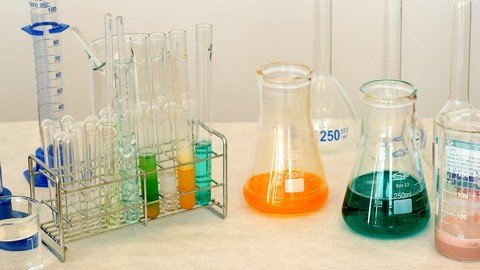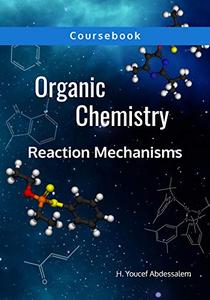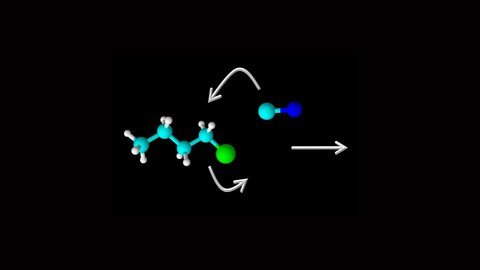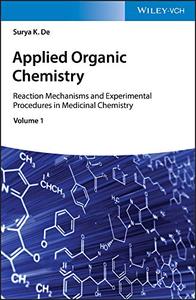Advanced Organic Chemistry - Reactions And Mechanism
"softddl.org"
8-07-2022, 05:17
-
Share on social networks:
-
Download for free: Advanced
-

Last updated 12/2018
MP4 | Video: h264, 1280x720 | Audio: AAC, 44.1 KHz
Language: English | Size: 1.63 GB | Duration: 7h 10m

Last updated 12/2018
MP4 | Video: h264, 1280x720 | Audio: AAC, 44.1 KHz
Language: English | Size: 1.63 GB | Duration: 7h 10m
This course deals with the application of structure and theory to the study of organic reaction mechanisms
What you'll learn
Stereo-chemistry , reaction mechanism and structure.
Requirements
Students who want to take this course should have interest in organic chemistry as such there is no need of any previous knowledge or tools.
Description
In this course I have attempted to give equal weight to the three fundamental aspects of the study of organic chemistry : Reactions , mechanism and structure.This course provides a deeper understanding of the reactivity and properties of organic compounds. Stereo-chemical features including conformation and stereo-electronic effects; Aromatic compounds , carboxylic acids and aldehydes and ketones are explained in detail.
Overview
Section 1: Introduction
Lecture 1 Introduction
Section 2: STEREOCHEMISTRY
Lecture 2 ISOMERISM- INTRODUCTION
Lecture 3 STRUCTURAL ISOMERISM- CHAIN ISOMERISM
Lecture 4 POSITION ISOMERISM
Lecture 5 FUNCTIONAL ISOMERISM
Lecture 6 METAMERISM
Lecture 7 KETO-ENOL TAUTOMERISM
Lecture 8 CONFORMATIONAL ISOMERISM PART-1
Lecture 9 CONFORMATIONAL ISOMERISM PART-2
Lecture 10 GEOMETRICAL ISOMERISM PART-1
Lecture 11 GEOMETRICAL ISOMERISM PART-2
Lecture 12 CHIRALITY
Lecture 13 OPTICAL ISOMERISM
Lecture 14 R and S Configuration
Section 3: Aromatic Compounds
Lecture 15 What are Aromatic , Anti-Aromatic and Non-Aromatic compounds
Lecture 16 Types Of Aromatic Compounds
Lecture 17 Electrophilic Aromatic Substitution Reactions - MECHANISM
Lecture 18 Halogenation and Nitration of benzene
Section 4: Electrophilic Addition Reactions
Lecture 19 Electrophilic Addition Reactions 1
Lecture 20 Rearrangement of carbocation in electrophilic addition reaction
Lecture 21 PEROXIDE EFFECT --- ANTI-MARKOVNOKOVS ADDITION REACTION
Lecture 22 HYDRATION OF ALKENES -ADDITION OF WATER TO ALKENES
Lecture 23 HALOGENATION TO ALKENES-- ADDITION OF HALOGENS TO ALKENES
Lecture 24 HYDROGENATION OF ALKENES-- ADDITION OF HYDROGEN TO ALKENES
Lecture 25 Halohydrin formation and Anti-dihydroxylation
Lecture 26 Epoxidation of alkenes and Anti-dihydroxylation
Lecture 27 Halohydrin Formation Practice questions
Lecture 28 Addition Reaction of alkenes Practice Problems
Lecture 29 Reductive Ozonolysis Of Alkenes - Mechanism with Examples
Section 5: Electrophilic Aromatic Substitution Reactions
Lecture 30 What are ortho-para and meta directing groups ?
Lecture 31 Ortho para directing groups and Ring activators
Lecture 32 Meta directing groups and Ring deactivating groups
Lecture 33 Ring Activators and Ring deactivators Numericals
Lecture 34 Electrophilic Attack on Disubstituted Benzenes
Section 6: Aldehydes and Ketones
Lecture 35 PREPERATION OF ALDEHYDES AND KETONES
Lecture 36 preperation of aldehydes and ketones from nitriles
Lecture 37 Aldehydes and Ketones from Acid chlorides
Lecture 38 Aldehydes and Ketones from Alkenes by Ozonolysis
Lecture 39 Aldehydes and ketones - Physical Properties
Lecture 40 Nucleophilic Addition reactions Of Aldehydes and Ketones
Lecture 41 Addition of Grignard reagent to Aldehydes and Ketones
Lecture 42 Hydration of aldehydes and ketones
Lecture 43 Acetal formation from aldehydes and Ketones
Lecture 44 Oxidation of aldehydes and ketones
Lecture 45 Reduction of aldehydes and ketones
Section 7: Carboxylic Acids
Lecture 46 Preparation of Carboxylic acids
Lecture 47 Physical Properties of Carboxylic acids
Lecture 48 Acidic Nature of Carboxylic acids
Anyone who is going to take or is currently taking organic chemistry
Homepage
https://www.udemy.com/course/advanced-organic-chemistry-reactions-and-mechanism/
https://rapidgator.net/file/8f5fbaec2b8921d0e2553dfcf3157086/bfikj.Advanced.Organic.Chemistry..Reactions.And.Mechanism.part1.rar.html
https://rapidgator.net/file/958ea7e193c0db52a3a64d2983efa91f/bfikj.Advanced.Organic.Chemistry..Reactions.And.Mechanism.part2.rar.html

https://nitro.download/view/14CCFB930F413A0/bfikj.Advanced.Organic.Chemistry..Reactions.And.Mechanism.part1.rar
https://nitro.download/view/F025EACB438ECB9/bfikj.Advanced.Organic.Chemistry..Reactions.And.Mechanism.part2.rar

https://uploadgig.com/file/download/10883D6619c7b462/bfikj.Advanced.Organic.Chemistry..Reactions.And.Mechanism.part1.rar
https://uploadgig.com/file/download/49474de83E3A4a78/bfikj.Advanced.Organic.Chemistry..Reactions.And.Mechanism.part2.rar
Links are Interchangeable - No Password - Single Extraction
The minimum comment length is 50 characters. comments are moderated





